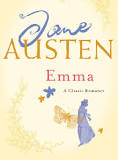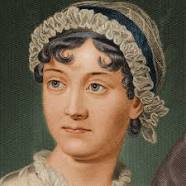Emma Page #34
Emma, by Jane Austen, is a novel about youthful hubris and the perils of misconstrued romance. The story takes place in the fictional village of Highbury and the surrounding estates of Hartfield, Randalls, and Donwell Abbey and involves the relationships among individuals in those locations consisting of "3 or 4 families in a country village". The novel was first published in December 1815 while the author was alive, with its title page listing a publication date of 1816. As in her other novels, Austen explores the concerns and difficulties of genteel women living in Georgian–Regency England; she also creates a lively comedy of manners among her characters and depicts issues of marriage, gender, age, and social status.
“I am very much astonished, Mr. Elton. This to me! you forget yourself--you take me for my friend--any message to Miss Smith I shall be happy to deliver; but no more of this to me, if you please.” “Miss Smith!--message to Miss Smith!--What could she possibly mean!”--And he repeated her words with such assurance of accent, such boastful pretence of amazement, that she could not help replying with quickness, “Mr. Elton, this is the most extraordinary conduct! and I can account for it only in one way; you are not yourself, or you could not speak either to me, or of Harriet, in such a manner. Command yourself enough to say no more, and I will endeavour to forget it.” But Mr. Elton had only drunk wine enough to elevate his spirits, not at all to confuse his intellects. He perfectly knew his own meaning; and having warmly protested against her suspicion as most injurious, and slightly touched upon his respect for Miss Smith as her friend,--but acknowledging his wonder that Miss Smith should be mentioned at all,--he resumed the subject of his own passion, and was very urgent for a favourable answer. As she thought less of his inebriety, she thought more of his inconstancy and presumption; and with fewer struggles for politeness, replied, “It is impossible for me to doubt any longer. You have made yourself too clear. Mr. Elton, my astonishment is much beyond any thing I can express. After such behaviour, as I have witnessed during the last month, to Miss Smith--such attentions as I have been in the daily habit of observing--to be addressing me in this manner--this is an unsteadiness of character, indeed, which I had not supposed possible! Believe me, sir, I am far, very far, from gratified in being the object of such professions.” “Good Heaven!” cried Mr. Elton, “what can be the meaning of this?--Miss Smith!--I never thought of Miss Smith in the whole course of my existence--never paid her any attentions, but as your friend: never cared whether she were dead or alive, but as your friend. If she has fancied otherwise, her own wishes have misled her, and I am very sorry--extremely sorry--But, Miss Smith, indeed!--Oh! Miss Woodhouse! who can think of Miss Smith, when Miss Woodhouse is near! No, upon my honour, there is no unsteadiness of character. I have thought only of you. I protest against having paid the smallest attention to any one else. Every thing that I have said or done, for many weeks past, has been with the sole view of marking my adoration of yourself. You cannot really, seriously, doubt it. No!--(in an accent meant to be insinuating)--I am sure you have seen and understood me.” It would be impossible to say what Emma felt, on hearing this--which of all her unpleasant sensations was uppermost. She was too completely overpowered to be immediately able to reply: and two moments of silence being ample encouragement for Mr. Elton's sanguine state of mind, he tried to take her hand again, as he joyously exclaimed-- “Charming Miss Woodhouse! allow me to interpret this interesting silence. It confesses that you have long understood me.” “No, sir,” cried Emma, “it confesses no such thing. So far from having long understood you, I have been in a most complete error with respect to your views, till this moment. As to myself, I am very sorry that you should have been giving way to any feelings--Nothing could be farther from my wishes--your attachment to my friend Harriet--your pursuit of her, (pursuit, it appeared,) gave me great pleasure, and I have been very earnestly wishing you success: but had I supposed that she were not your attraction to Hartfield, I should certainly have thought you judged ill in making your visits so frequent. Am I to believe that you have never sought to recommend yourself particularly to Miss Smith?--that you have never thought seriously of her?” “Never, madam,” cried he, affronted in his turn: “never, I assure you. I think seriously of Miss Smith!--Miss Smith is a very good sort of girl; and I should be happy to see her respectably settled. I wish her extremely well: and, no doubt, there are men who might not object to--Every body has their level: but as for myself, I am not, I think, quite so much at a loss. I need not so totally despair of an equal alliance, as to be addressing myself to Miss Smith!--No, madam, my visits to Hartfield have been for yourself only; and the encouragement I received--” “Encouragement!--I give you encouragement!--Sir, you have been entirely mistaken in supposing it. I have seen you only as the admirer of my friend. In no other light could you have been more to me than a common acquaintance. I am exceedingly sorry: but it is well that the mistake ends where it does. Had the same behaviour continued, Miss Smith might have been led into a misconception of your views; not being aware, probably, any more than myself, of the very great inequality which you are so sensible of. But, as it is, the disappointment is single, and, I trust, will not be lasting. I have no thoughts of matrimony at present.” He was too angry to say another word; her manner too decided to invite supplication; and in this state of swelling resentment, and mutually deep mortification, they had to continue together a few minutes longer, for the fears of Mr. Woodhouse had confined them to a foot-pace. If there had not been so much anger, there would have been desperate awkwardness; but their straightforward emotions left no room for the little zigzags of embarrassment. Without knowing when the carriage turned into Vicarage Lane, or when it stopped, they found themselves, all at once, at the door of his house; and he was out before another syllable passed.--Emma then felt it indispensable to wish him a good night. The compliment was just returned, coldly and proudly; and, under indescribable irritation of spirits, she was then conveyed to Hartfield. There she was welcomed, with the utmost delight, by her father, who had been trembling for the dangers of a solitary drive from Vicarage Lane--turning a corner which he could never bear to think of--and in strange hands--a mere common coachman--no James; and there it seemed as if her return only were wanted to make every thing go well: for Mr. John Knightley, ashamed of his ill-humour, was now all kindness and attention; and so particularly solicitous for the comfort of her father, as to seem--if not quite ready to join him in a basin of gruel--perfectly sensible of its being exceedingly wholesome; and the day was concluding in peace and comfort to all their little party, except herself.--But her mind had never been in such perturbation; and it needed a very strong effort to appear attentive and cheerful till the usual hour of separating allowed her the relief of quiet reflection.
Translation
Translate and read this book in other languages:
Select another language:
- - Select -
- 简体中文 (Chinese - Simplified)
- 繁體中文 (Chinese - Traditional)
- Español (Spanish)
- Esperanto (Esperanto)
- 日本語 (Japanese)
- Português (Portuguese)
- Deutsch (German)
- العربية (Arabic)
- Français (French)
- Русский (Russian)
- ಕನ್ನಡ (Kannada)
- 한국어 (Korean)
- עברית (Hebrew)
- Gaeilge (Irish)
- Українська (Ukrainian)
- اردو (Urdu)
- Magyar (Hungarian)
- मानक हिन्दी (Hindi)
- Indonesia (Indonesian)
- Italiano (Italian)
- தமிழ் (Tamil)
- Türkçe (Turkish)
- తెలుగు (Telugu)
- ภาษาไทย (Thai)
- Tiếng Việt (Vietnamese)
- Čeština (Czech)
- Polski (Polish)
- Bahasa Indonesia (Indonesian)
- Românește (Romanian)
- Nederlands (Dutch)
- Ελληνικά (Greek)
- Latinum (Latin)
- Svenska (Swedish)
- Dansk (Danish)
- Suomi (Finnish)
- فارسی (Persian)
- ייִדיש (Yiddish)
- հայերեն (Armenian)
- Norsk (Norwegian)
- English (English)
Citation
Use the citation below to add this book to your bibliography:
Style:MLAChicagoAPA
"Emma Books." Literature.com. STANDS4 LLC, 2025. Web. 10 Jan. 2025. <https://www.literature.com/book/emma_29>.




Discuss this Emma book with the community:
Report Comment
We're doing our best to make sure our content is useful, accurate and safe.
If by any chance you spot an inappropriate comment while navigating through our website please use this form to let us know, and we'll take care of it shortly.
Attachment
You need to be logged in to favorite.
Log In